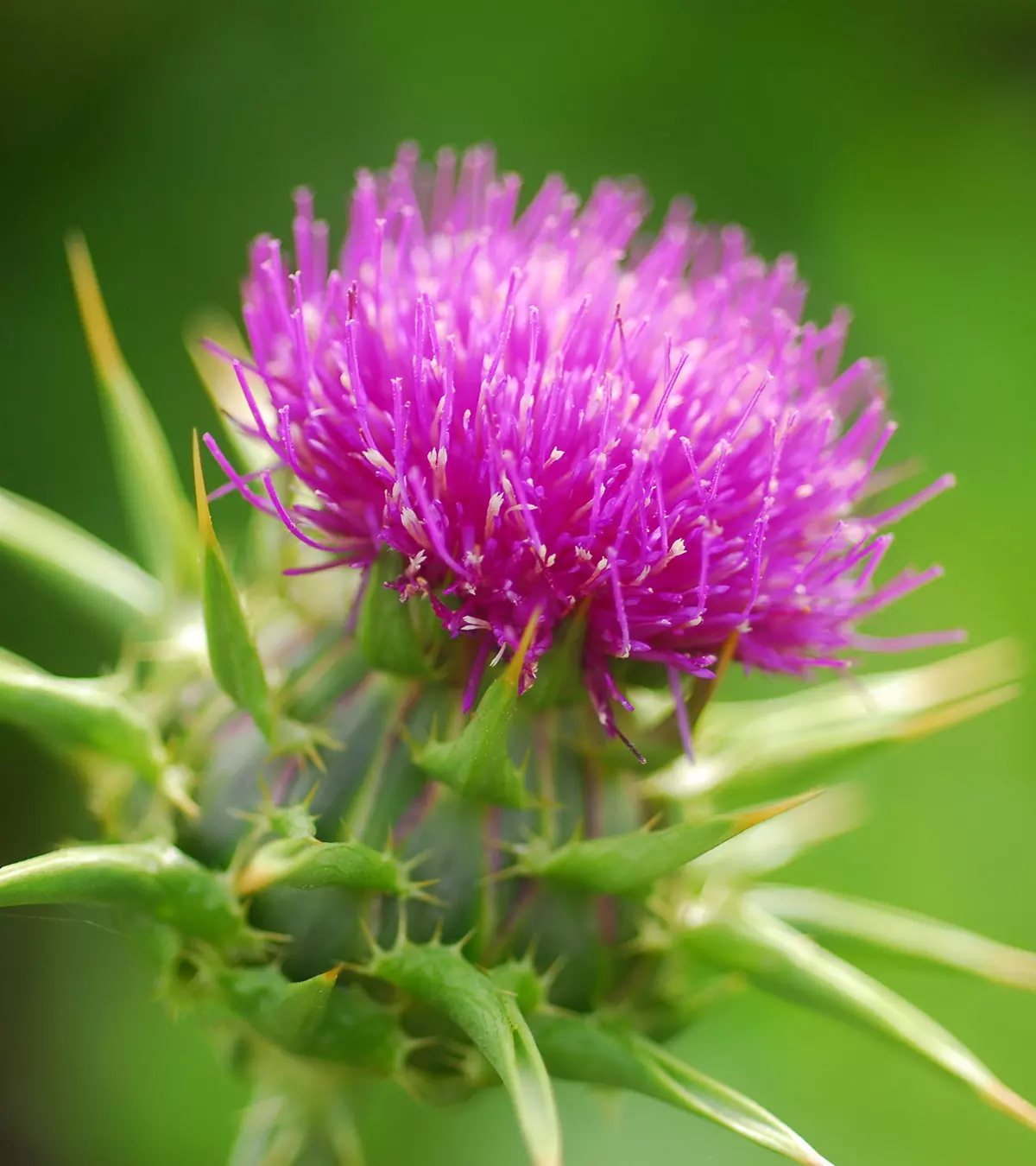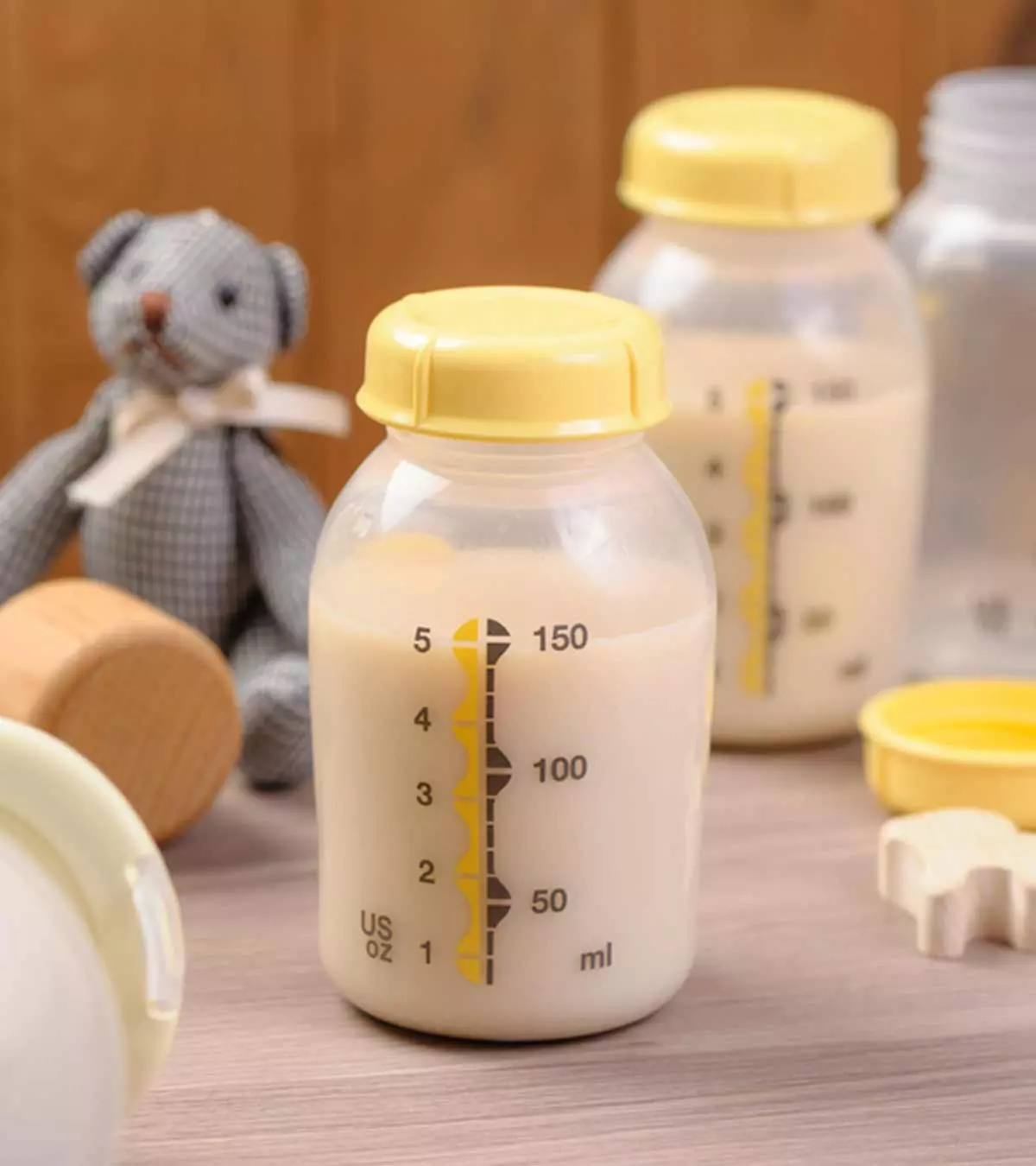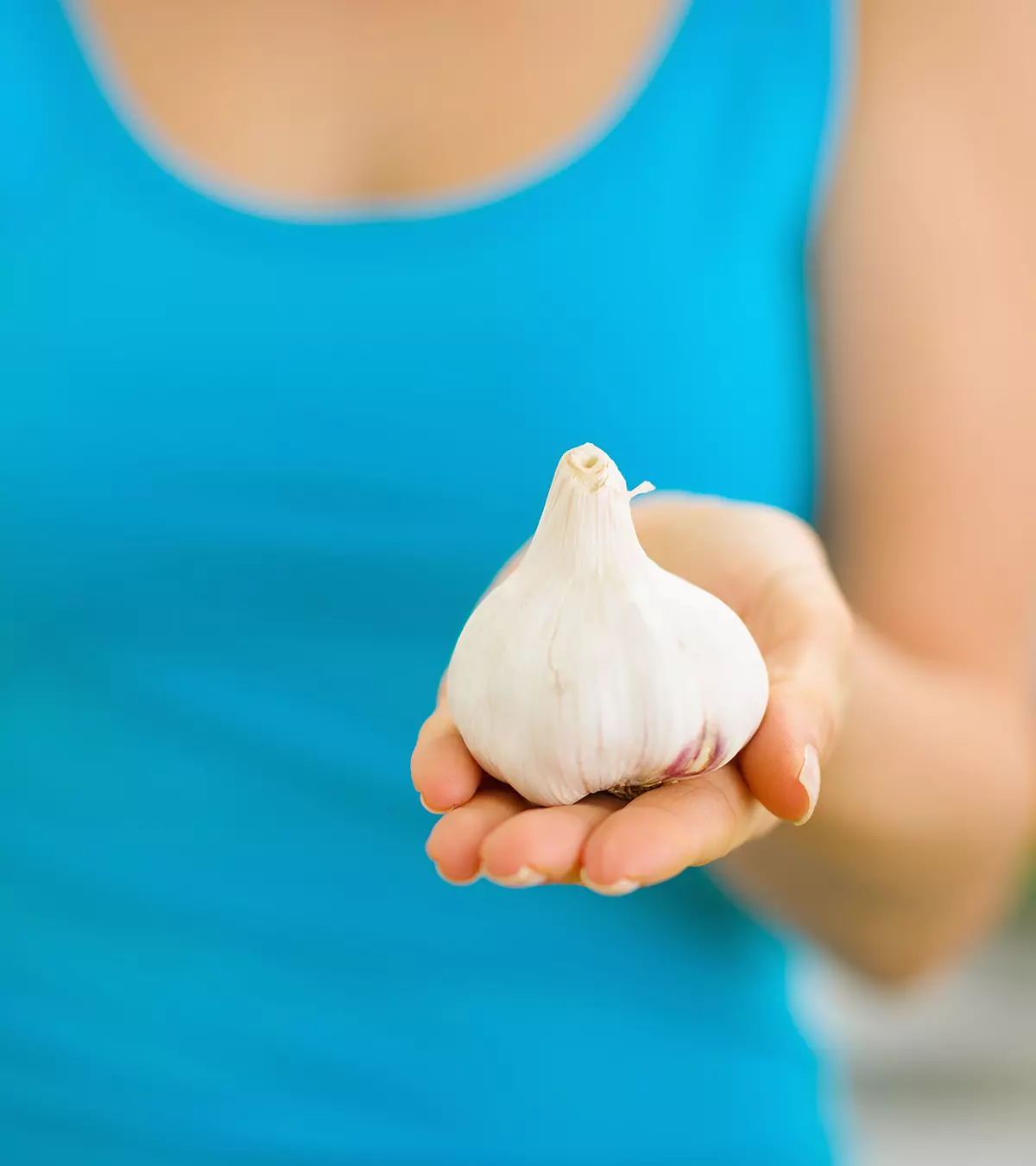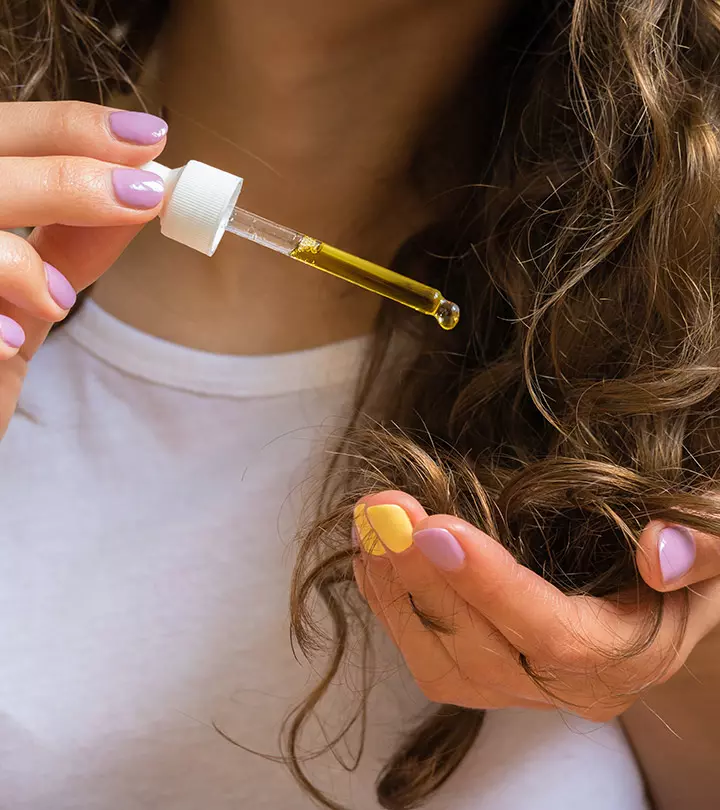
Image: ShutterStock
Essential oils (EOs) are volatile oils extracted from aromatic plants or herbs.
These fragrant, rejuvenating oils are used in aromatherapy and traditional medicine for therapeutic, relaxation, and cosmetic purposes. Some also consider it as an alternative medicine to conventional ones. However, though they are generally considered safe, some mothers may wonder, “Is it safe to use essential oils when breastfeeding?”
Understanding this information is vital to ascertain the safety of the lactating mother and her baby. Read on to learn more about the safety of EOs for nursing moms, which EOs are safe to use when breastfeeding, and which should be avoided. Also, the article shares precautionary tips mothers should observe while using essential oils.
Key Pointers
- Essential oils can be used while breastfeeding under the guidance of a healthcare practitioner.
- Fennel oil, lavender oil, clary sage oil, chamomile oil, geranium oil, helichrysum oil, and tea tree oil are generally considered safe to use while breastfeeding.
- Pure essential oils should be bought from reliable sellers and used according to the doctor’s instructions.
- Allergies should be checked by doing a test before using the oil, and it should be used after diluting it with a carrier oil.
- Nursing women should avoid using essential oils such as basil, oregano, and peppermint oil.
Is It Safe To Use Essential Oils When Breastfeeding?
When used under medical guidance, the use of EOs can be considered “possibly safe” when breastfeeding. Although most oils are available over the counter, the safety regulations vary for various essential oils.
The use of essential oils as plant therapy or herbal treatment remedies is prevalent. However, for every therapy, the mode of use must be directed by a healthcare provider, since an EO can be specific to the purpose of use.
Essential Oils Considered Safe When Breastfeeding
The following plant-based EOs are generally considered safe to use during breastfeeding. However, individual cases may be different. Hence, consult a doctor or a lactation expert before using them for your wellness.
- Fennel oil: Fennel essential oil is believed to be a galactagogue that increases milk production. Besides, it is used in natural remedies for treating lactation-related issues such as breast inflammation and clogged milk ducts.
Nia, a mother to three, shares her experience using fennel oil to boost breast milk production. She says, “You can apply this topically; from what I’ve heard, read, and experienced myself, it works. All you are going to do is grab a drop or two (of fennel oil with a carrier oil) and massage all around your breast. I have also taken fenugreek and added fennel supplements, which increased my breast milk (i).”
However, there is no conclusive research on the safety and efficacy of the oil. Fennel essential oil might cause allergic reactions after oral or topical use due to cross-reactivity with plants of the Apiaceae family such as carrots and celery (1). Fennel oil should be avoided during pregnancy.
 Research finds
Research finds
Image: IStock
- Lavender oil: A research study showed that lavender oil aromatherapy in the first hours of the postpartum period could result in the physical and mental health of the mother (2). While another study demonstrated that inhaling lavender scent for four weeks can prevent stress, anxiety, and postpartum depression (3). However, its topical application around the breast area must be avoided due to its estrogenic and anti androgenic activity (4) (5). Lavender is “generally recognized as safe”.
- Clary sage: Clary sage has therapeutic uses due to its antimicrobial activity (6). It has been observed that clary sage can help enhance breast milk supply in cases where the mother experiences a low milk supply. Clary sage is different from sage, which is known to reduce milk flow. It’s best to avoid breast area and for newborn not to be in contact with the oil. Since this particular oil has a strong aroma, it’s recommended to avoid it during the postpartum period to maintain safety in infant care. This is because, during this time, babies use their sense of smell to coordinate.
- Tea tree oil: Due to its promising antimicrobial activity, you could consider the topical application of tea tree oil as a herbal treatment for infections (7). However, due to its estrogenic and anti-androgenic activity, avoid applying it around the breast. Also, avoid oral consumption of tea tree oil (8).
 Caution
Caution- Chamomile oil: Chamomile herbal treatment is used orally for sedative and gastrointestinal purposes and topically for wound healing. During lactation, it is used for its calming effect and possible role in milk production. Chamomile is also considered a galactagogue, although there is no clinical evidence to this effect (9). It should be noted that botulismiA nerve disorder caused by the bacterium Clostridium botulinum leading to breathing issues and muscle and gastrointestinal problems spores have been found in some loose-leaf chamomile teas sold in health food stores.

Image: Shutterstock
- Germanium oil: Its topical use is prevalent for soothing cracked, painful nipples during breastfeeding. Also, it is used for treating neuropathic painiPain induced by damaged functioning of the nerves . It is believed to have antibacterial and antifungal activity (10).
- Helichrysum oil: Helichrysum essential oil is considered as a herbal treatment for ailments such as eczemaiAn inflammation of the skin accompanied by itchiness and dryness commonly triggered by an allergen , bacterial infections, blisters, fungal infections, inflammation, sores, ulcers, and wounds (11). The herb is believed to have anti spastic and anti-inflammatory properties (12). However, the safety of its use while breastfeeding needs more research.
Whether applying an EO topically or using it orally as a dietary supplement, professional guidance is essential. Also, consult a healthcare provider before using essential oils for baby skin. However, there are certain oils that should always be avoided while breastfeeding.
Essential Oils To Avoid When Breastfeeding
The following EOs are generally considered not safe for use when breastfeeding.
- Basil: In herbal medicine, basil oil is used to reduce milk supply and manage hypergalactia, which is an oversupply of breast milk (13). This property of basil oil is useful for mothers experiencing engorgediSwelling of a body part due to fluid retention, sometimes leading to pain breasts. However, clinical experts recommend avoiding basil oil even in small doses during lactation because of the lack of safety information.
- Oregano: The use of oregano oil has been widely recommended in herbal remedies. The oil is known for its nourishing properties and is said to cure infections, such as those caused by Candida fungus on the nipple area. But there are no clear clinical indications about the oil’s safety and efficacy. Thus, clinical experts suggest avoiding its use while nursing (14).
- Peppermint: The topical use of peppermint oil to treat nipple fissureiBloody, cracked, and sore nipples is prevalent in herbal medicine. This is done due to the anti-inflammatory and anti-infection properties of the oil (15) (16). However, its use should be avoided while breastfeeding, as it might reduce milk supply.

Image: Shutterstock
Besides these common oils, there are a few others, such as aniseed, mugwort, camphor, and parsley that need to be avoided when breastfeeding (17).
Things To Consider Before Using EOs When Breastfeeding
Consider these points to make safe use of essential oil during the breastfeeding phase after you enter motherhood (18).
- EOs are different from herbs. Thus, a herb may be safe to use while breastfeeding, but its essential oil is not necessarily safe.
- The chemical composition of all the essential oils is not the same. For example, EOs rich in phenolsiA class of secondary metabolites found primarily in plants with anti-inflammatory and antioxidant properties and aldehydesiAn organic compound useful in the manufacture of detergents, perfumes, dyes, and resins may cause allergy in some individuals. Maternal allergy can impact breastfeeding and the infant’s health.
- It is important to ensure the purity of essential oils. Purchase pure grade oils from reliable brands.
- The mode of use for every EO is not the same. Some may be safe to ingest or use topically, while others may not.
- Before planning to ingest an essential oil, check if it is recognized as safe for oral use. Most essential oil manufacturers do not recommend oral use while breastfeeding since the oil may reach breast milk.
- Dosage and duration of essential oils vary. Some oils can be used safely in limited amounts for a long duration.
- Different essential oils perform different functions in the body.
Precautions To Take While Using Essential Oils
You can ensure essential oils safety by following some precautions.
- Use under medical guidance: Use the EOs only under medical instructions. Incorrect use might have adverse effects.
- Use carrier oil: Dilute the EO with a carrier oiliPlant-based oils used to dilute the essential oils as they are highly potent to make it easy to apply and also reduce the risk of rashes or irritation caused by undiluted oil.
- Do a patch test: If you have a history of allergies, then discuss the use of essential oil with your doctor. Always perform a skin patch test when using essential oil for the first time. It can help you know if you are allergic to it.

Image: IStock
- Buy from reliable sellers: Essential oils bought from unreliable sellers have a higher risk of being contaminated with other oils. For instance, chamomile oil can be contaminated by “dog chamomile,” a highly allergenic plant of similar appearance (19).
- Beware of possible drug interaction: Underlying medical conditions and medicines to treat them could interact with EOs. If you are on some medication or have a medical condition, then use essential oils under doctor guidance only.
- Do not use for long: Any herbal treatment or aromatherapy with an essential oil must be performed for a recommended duration only. Prolonged use of oil can be harmful, especially in the case of aromatics.
- Avoid photo sensitivity: Check for oils that cause photosensitivity and avoid their use before exposure to sunlight, as they can cause burns. Citrus oils are known to cause photosensitivity.
- Keep essential oils away from children: The ingestion of essential oils could be toxic for babies and children. Thus, to ensure the safety of your baby and their siblings, keep the essential oils locked in a dark, cool area.
- Wash hands after use: Unwashed hands could cause the oil to accidentally enter your eyes, ears, or nose, and cause irritation. It may also accidentally get to your baby’s skin and cause adverse reactions.
- Do not use expired oils: Using expired essential oils can do more harm than good. Firstly, they will not serve your purpose of use. Secondly, it could cause a skin reaction and other adverse effects.
Frequently Asked Questions
1. Can I use eucalyptus oil while breastfeeding?
Using eucalyptus oil for topical or diffusion purposes is generally considered safe when used in diluted form and under the guidance of an expert. However, expectant mothers should not ingest it as it can be toxic and may cause nausea, vomiting, or diarrhea (20) (21).
2. Is frankincense oil safe for breastfeeding mothers?
Frankincense oil is believed to have anti-inflammatory and anti-depressive properties that may help enhance mood and promote sleep. However, limited scientific research is available to support its safety and effectiveness for breastfeeding mothers. Therefore, consulting with a qualified alternative medicine expert is recommended before using frankincense oil when nursing (22).
3. What are the effects of applying bergamot essential oil while breastfeeding?
Bergamot oil is generally considered safe, but studies regarding its safety and efficacy for nursing mothers are limited. Therefore, it should be used only under medical guidance for topical, oral, or diffusion purposes.
EOs can be useful for lactation-related concerns. However, they must be used with caution. Considering the potential side-effects that they may have, it is wise to use them as per medical advice only.
Infographic: How To Check The Purity Of The Essential Oils?
You have carefully read through and bought the safe-to-use essential oil. But how do you know this is pure and not a fake one? Essential oils, especially during breastfeeding, need to be double-checked for their purity to reap the benefits and avoid adverse reactions. So use this infographic for tips to check the essential oil for purity. Illustration: Momjunction Design Team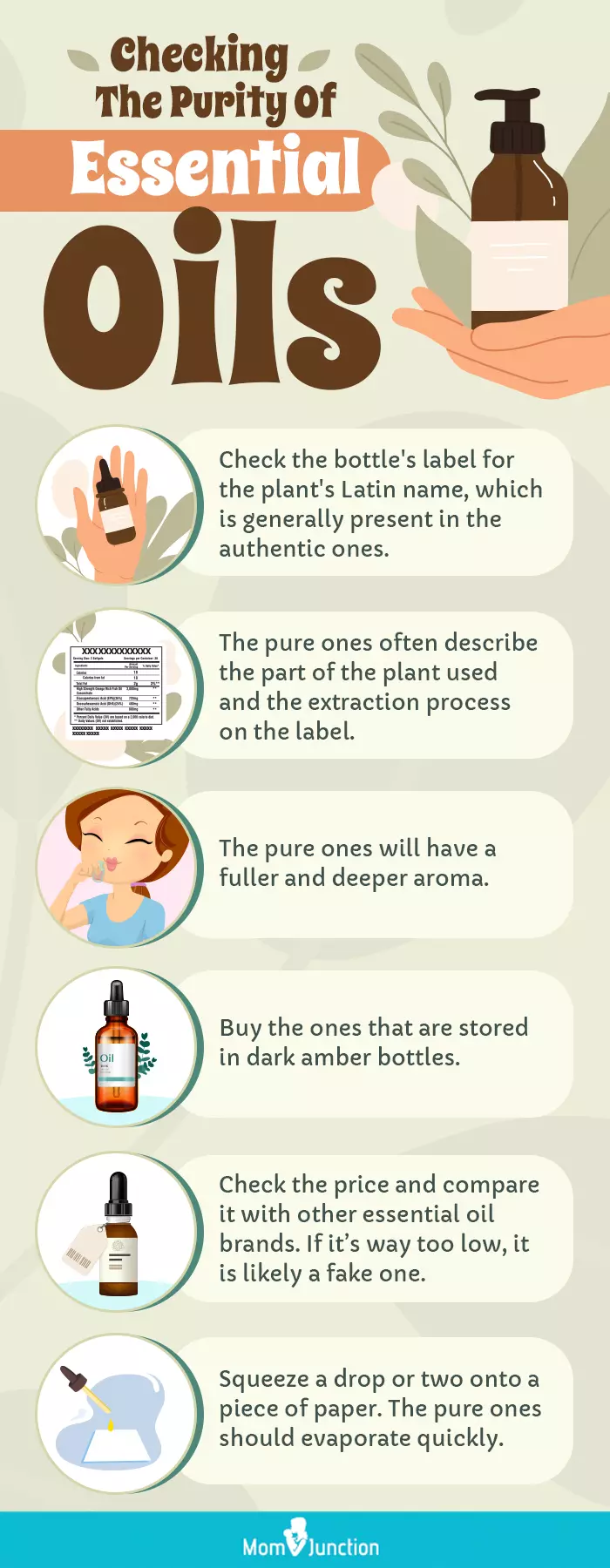
Illustration: MomJunction Design Team
Illustration: Essential Oils To Boost Milk Supply In Breastfeeding
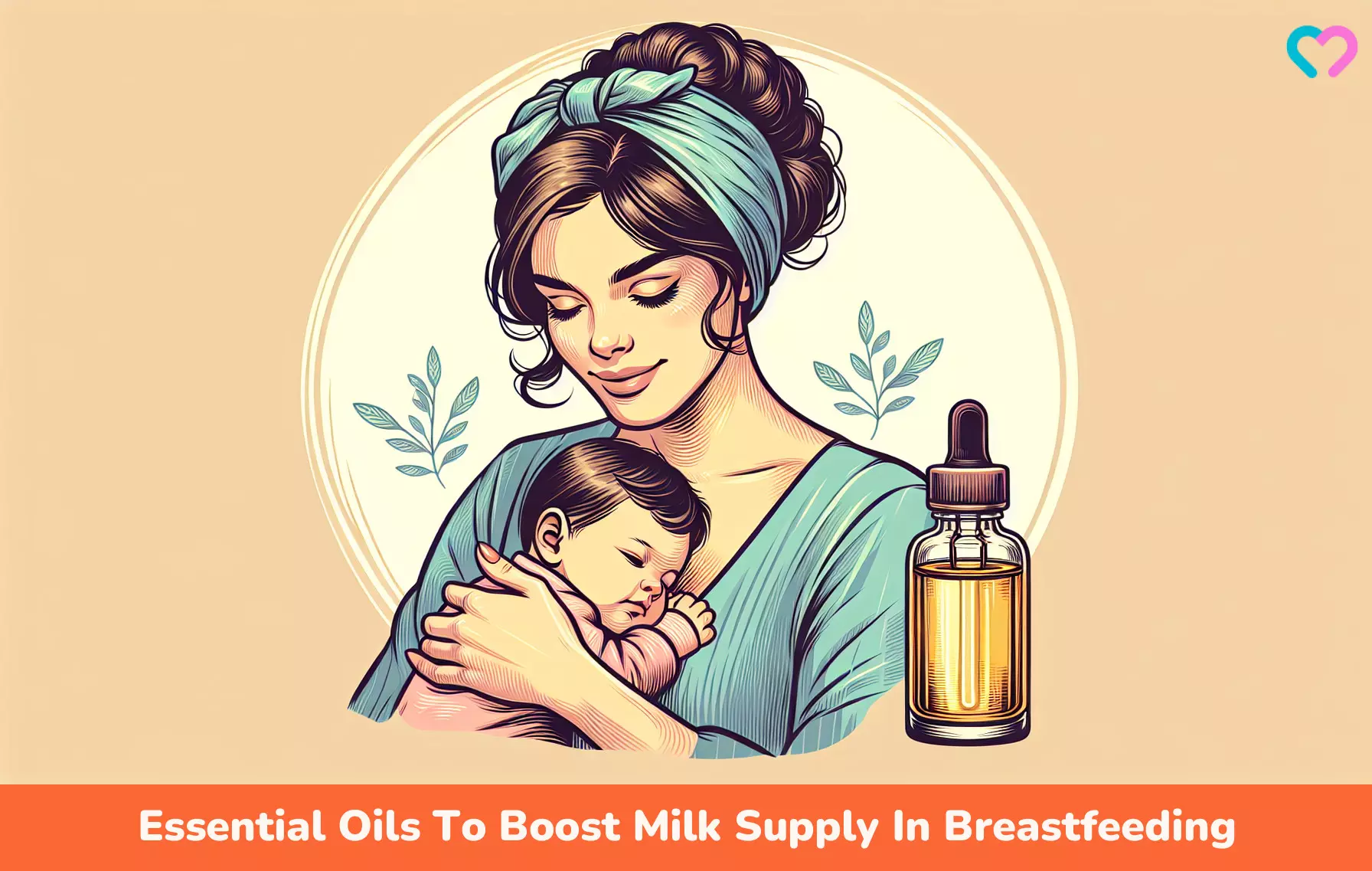
Image: Dalle E/MomJunction Design Team
Essential oils are known for their rejuvenating properties, but are they safe for your nursing baby? Watch this video to learn more about the use of these oils during breastfeeding.
Personal Experience: Source
MomJunction articles include first-hand experiences to provide you with better insights through real-life narratives. Here are the sources of personal accounts referenced in this article.
i. DIY breastmilk boost | Fennel essential oil tutorial;https://www.youtube.com/watch?v=AxDY1Uj1cuU&feature=youtu.be
References
1. Fennel; Drug and Lactation Database; National Center For Biotechnology Information
2. FaridehVaziri, MahsaShiravani et al.; Effect of Lavender Oil Aroma in the Early Hours of Postpartum Period on Maternal Pains, Fatigue, and Mood: A Randomized Clinical Trial; National Center For Biotechnology Information
3. Maryam Kianpour et al.; Effect of lavender scent inhalation on prevention of stress, anxiety and depression in the postpartum period; National Center For Biotechnology Information
4. Lavender; Drug and Lactation Database; National Center For Biotechnology Information
5. PeirHosseinKoulivand et al.; Lavender and the Nervous System; National Center For Biotechnology Information
6. BabarAli et al.; Essential oils used in aromatherapy: A systemic review; Science Direct
7. Halcón L and Milkus K; Staphylococcus aureus and wounds: a review of tea tree oil as a promising antimicrobial.; National Center For Biotechnology Information
8. Tea Tree Oil; Drug and Lactation Database; National Center For Biotechnology Information
9. Chamomile; Drug and Lactation Database; National Center For Biotechnology Information
10. Geranium; Drug and Lactation Database; National Center For Biotechnology Information
11. Ané Orchard and Sandy van Vuuren; Commercial Essential Oils as Potential Antimicrobials to Treat Skin Diseases; National Center For Biotechnology Information
12. Susanna Stea et al.; Essential Oils for Complementary Treatment of Surgical Patients: State of the Art; National Center For Biotechnology Information
13. Basil; Drug and Lactation Database; National Center For Biotechnology Information
14. Oregano; Drug and Lactation Database; National Center For Biotechnology Information
15. Sedigheh Amir Ali Akbari et al.; Effects of menthol essence and breast milk on the improvement of nipple fissures in breastfeeding women; National Center For Biotechnology Information
16. MahnazShanazi et al.; Comparison of the Effects of Lanolin, Peppermint, and Dexpanthenol Creams on Treatment of Traumatic Nipples in Breastfeeding Mothers; National Center For Biotechnology Information
17. The Safe Use of Essential Oils; The International Childbirth Education Association
18. Safety Information; The National Association for Holistic Aromatherapy
19. Janmejai K Srivastava et al.; Chamomile: A herbal medicine of the past with bright future; National Center For Biotechnology Information
20. Eucalyptus; Mountsinai
21. Druginfo; Medlineplus
22. Essential oils; Health.cleveland clinic
Community Experiences
Join the conversation and become a part of our nurturing community! Share your stories, experiences, and insights to connect with fellow parents.
Read full bio of Rebecca Koyf
Read full bio of Swati Patwal
Read full bio of Rohit Garoo
Read full bio of Anindita Ghatak





